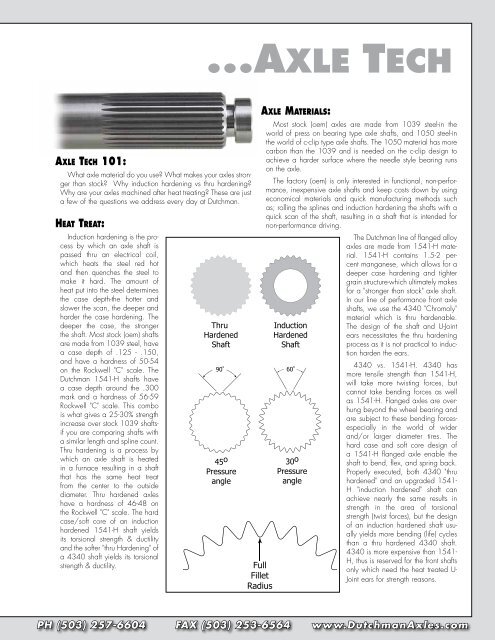You also want an ePaper? Increase the reach of your titles
YUMPU automatically turns print PDFs into web optimized ePapers that Google loves.
...AXLE TECH<br />
Axle Tech 101:<br />
What <strong>axle</strong> material do you use? What makes your <strong>axle</strong>s stronger<br />
than stock? Why induction hardening vs thru hardening?<br />
Why are your <strong>axle</strong>s machined after heat treating? These are just<br />
a few of the questions we address every day at Dutchman.<br />
Heat Treat:<br />
Induction hardening is the process<br />
by which an <strong>axle</strong> shaft is<br />
passed thru an electrical coil,<br />
which heats the steel red hot<br />
and then quenches the steel to<br />
make it hard. The amount of<br />
heat put into the steel determines<br />
the case depth-the hotter and<br />
slower the scan, the deeper and<br />
harder the case hardening. The<br />
deeper the case, the stronger<br />
the shaft. Most stock (oem) shafts<br />
are made from 1039 steel, have<br />
a case depth of .125 - .150,<br />
and have a hardness of 50-54<br />
on the Rockwell "C" scale. The<br />
Dutchman 1541-H shafts have<br />
a case depth around the .300<br />
mark and a hardness of 56-59<br />
Rockwell "C" scale. This combo<br />
is what gives a 25-30% strength<br />
increase over stock 1039 shaftsif<br />
you are comparing shafts with<br />
a similar length and spline count.<br />
Thru hardening is a process by<br />
which an <strong>axle</strong> shaft is heated<br />
in a furnace resulting in a shaft<br />
that has the same heat treat<br />
from the center to the outside<br />
diameter. Thru hardened <strong>axle</strong>s<br />
have a hardness of 46-48 on<br />
the Rockwell "C" scale. The hard<br />
case/soft core of an induction<br />
hardened 1541-H shaft yields<br />
its torsional strength & ductility<br />
and the softer "thru Hardening" of<br />
a 4340 shaft yields its torsional<br />
strength & ductility.<br />
Thru<br />
Hardened<br />
Shaft<br />
Thru<br />
Hardened<br />
Shaft<br />
Thru<br />
Hardened<br />
Shaft<br />
Axle Materials:<br />
Most stock (oem) <strong>axle</strong>s are made from 1039 steel-in the<br />
world of press on bearing type <strong>axle</strong> shafts, and 1050 steel-in<br />
the world of c-clip type <strong>axle</strong> shafts. The 1050 material has more<br />
carbon than the 1039 and is needed on the c-clip design to<br />
achieve a harder surface where the needle style bearing runs<br />
on the <strong>axle</strong>.<br />
The factory (oem) is only interested in functional, non-performance,<br />
inexpensive <strong>axle</strong> shafts and keep costs down by using<br />
economical materials and quick manufacturing methods such<br />
as; rolling the splines and induction hardening the shafts with a<br />
quick scan of the shaft, resulting in a shaft that is intended for<br />
non-performance driving.<br />
Induction<br />
Hardened<br />
Shaft<br />
90 o 60 o<br />
90 o 60 o<br />
Full<br />
Fillet<br />
Radius<br />
Full<br />
Fillet<br />
Radius<br />
Full Fillet<br />
Radius<br />
Fillet<br />
Radius<br />
The Dutchman line of flanged alloy<br />
<strong>axle</strong>s are made from 1541-H material.<br />
1541-H contains 1.5-2 percent<br />
manganese, which allows for a<br />
deeper case hardening and tighter<br />
grain structure-which ultimately makes<br />
for a "stronger than stock" <strong>axle</strong> shaft.<br />
In our line of performance front <strong>axle</strong><br />
shafts, we use the 4340 "Chromoly"<br />
material which is thru hardenable.<br />
The design of the shaft and U-Joint<br />
ears necessitates the thru hardening<br />
process as it is not practical to induction<br />
harden the ears.<br />
4340 vs. 1541-H. 4340 has<br />
more tensile strength than 1541-H,<br />
will take more twisting forces, but<br />
cannot take bending forces as well<br />
as 1541-H. Flanged <strong>axle</strong>s are overhung<br />
beyond the wheel bearing and<br />
are subject to these bending forcesespecially<br />
in the world of wider<br />
and/or larger diameter tires. The<br />
hard case and soft core design of<br />
a 1541-H flanged <strong>axle</strong> enable the<br />
shaft to bend, flex, and spring back.<br />
Properly executed, both 4340 "thru<br />
hardened" and an upgraded 1541-<br />
H "induction hardened" shaft can<br />
achieve nearly the same results in<br />
strength in the area of torsional<br />
strength (twist forces), but the design<br />
of an induction hardened shaft usually<br />
yields more bending (life) cycles<br />
than a thru hardened 4340 shaft.<br />
4340 is more expensive than 1541-<br />
H, thus is reserved for the front shafts<br />
only which need the heat treated U-<br />
Joint ears for strength reasons.<br />
PH (503) 257-6604 FAX (503) 253-6564 www.DutchmanAxles.com<br />
Full<br />
Induction<br />
Hardened<br />
Shaft<br />
Induction<br />
Hardened<br />
Shaft<br />
90 o 60 o<br />
45 o<br />
Pressure<br />
angle<br />
30 o<br />
Pressure<br />
angle


